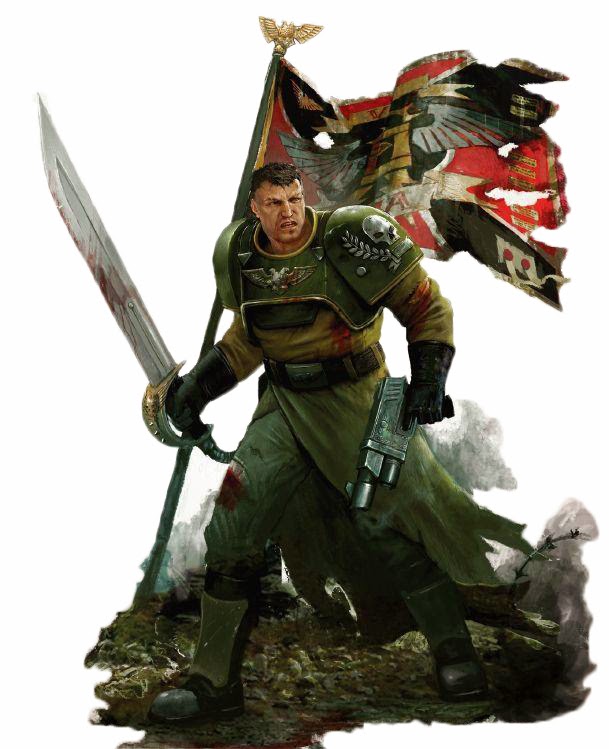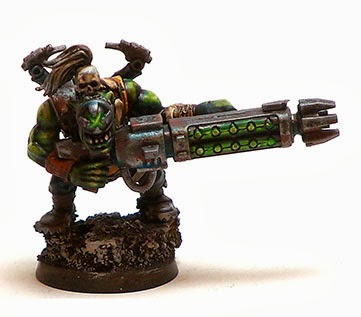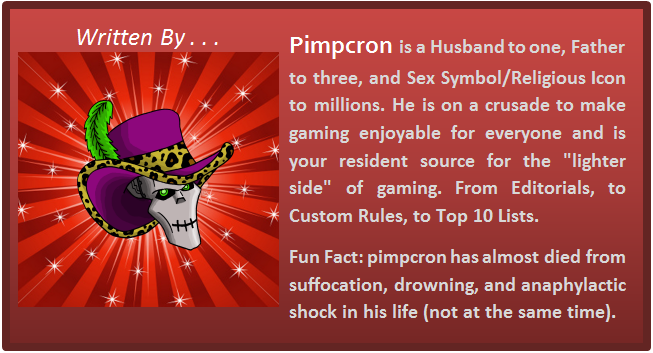40k: Improving Your Strategy


Pimpcron proves that G.I. Joe was right all along. . .
It is I, writer of nonsense, pimper of crons, your humble savant Pimpcron here. (No, I didn’t misspell “servant”) I want do some straight talk with you about strategy. What is it really? Where did it come from? What’s its favorite color? Let’s find out!
What do I Mean By Strategy?
In this article I am talking about the choices you make on the battlefield; not list-building. Of course there is strategy to building lists, but not the type of strategy I am going to discuss here. List-building strategy is more like using resources (points) efficiently rather than making good choices on the table top.
Do True Strategic Decisions Exist?
This may sound funny, but out of two choices, one of them is generally better than the other. When are any two things in life ever exactly even in merit? We like to kid ourselves into thinking that there’s no knowing which choice might be better in a given circumstance; as if the world is full of magic and every choice is simply the roll of a die. Who could know which choice is better? At face value, without complete knowledge, many of life’s choices seem this way. Let’s use an example to illustrate my point:
You are in close combat and the enemy’s Character challenges your unit’s Character, most people would say you have a choice: you can accept or decline the challenge. Without complete knowledge of what your odds of winning the challenge are, it is just flipping a coin.
Hive Tyrant challenging? Why not accept?
But wait a minute, we probably aren’t talking about two perfectly matched people if your opponent is so eager to challenge you. Now let’s say you know what his stats are: his Initiative is higher than yours and he has an AP2 weapon with Instant Death. You have no invulnerable save and your character is the guy buffing your unit with a special rule like Feel No Pain (so you’ll want to keep him alive). So now that we have more information about the situation, we know that there really isn’t a choice to be made. You either choose to live or die, and why would you just choose to die (nearly) guaranteed? So in my way of speaking, a no-brainer choice is really no choice at all. You either recognize that it would be foolish to just lay down and die, or you accept the challenge blindly without asking the other guy’s stats.
As you hopefully saw in my example, things aren’t as cut and dry as “you had a choice to accept or deny the challenge”. You may have thought that in the beginning of the scenario, but as more information became available to you, you realized that the better decision was a no-brainer.
This brings me to my main point behind strategy . . .
Knowledge Is Power
I know it sounds cheesy like, “The More You Know . . .” but choices are based off of knowledge, and incomplete knowledge may lead to a bad decision. So my first suggestion for a better strategy is to know as much about your opponent as possible when (or before) you play them. I have seen very competitive players actually buy codices they don’t own armies for just “for the crunch” as they say (I’m looking at you Alex). By “crunch” they mean the number crunch, the math hammer, getting into the guts of the combat system and knowing the probable outcome of any given match up.
 Weird or not? Well we really can’t say until we. . . just kidding, this is unsettling.
Weird or not? Well we really can’t say until we. . . just kidding, this is unsettling.
Now of course, that is a bid much for most of us less-competitive (or more normal) gamers. Most of the time it would help you to just simply ask your opponent what each unit does and what stats they are sporting. That will help greatly in making good decisions, if you don’t already do it.
Take something like rolling dice, something that we all usually say is more or less “random”. Well if you look at it from a Physics view, dice rolls aren’t random at all. If we knew the properties of every molecule in the dice: weight, density, the velocity, trajectory, friction of the table surface, even air movement around it, we could use math to predict the roll of the dice every time. Suddenly, with complete information, something “random” like a dice roll outcome was predetermined as soon as you let it go. They are only random to us because we have incomplete information.
The same goes for all choices we make. With complete information we would already know that one of the choices was really the better one all the time. No magic involved at all.
Knowing really is half the battle . . .
So What Exactly is Strategy?
Well clearly knowledge isn’t the entire strategy-enchilada. When it comes down to it: strategy is identifying and making the best choices through knowing the situation’s factors. Since we don’t have omniscient knowledge of all factors involved, we will have to settle for asking questions, knowing our own units well, and using our best judgement.
But some would say that strategy also involves anticipating your enemy’s actions. That is true to a degree, but trying to do this is often hit-or-miss for a few reasons. Your opponent may be better at strategy than you are, making it nearly impossible for you to accurately anticipate what they are going to do. Or on the other hand, your opponent may be worse than you at strategy and you will almost always over-estimate their abilities.
So How Does Your Opponent Factor In?
Preferably, you need to know enough about your opponent’s ability level to know if you can fake them out with your strategy and/or reliably predict theirs. Of course that isn’t always the case in pickup games with strangers, and humans in general can be unpredictable; just ask any Dungeon Master you know. So the next best thing for you to do is know what their motive is, thus being able to glean a bit of their strategy. For this, you need to know what their units do well and poorly. There’s the knowledge again that I keep talking about. If you know the strengths and weaknesses of their units, you can guess what they will probably be doing with them.
Examples: Speaking generally, Ork Boyz assault, Fire Warriors shoot, etcetera, etcetera, etcetera.
 For instance, you should ask what this really is before assaulting it. . .
For instance, you should ask what this really is before assaulting it. . .
So the bottom line of all of this is: Know your army, mission, opponent, and opponent’s units as well as you possibly can. Then all of your decisions become less of a choice, and more of a no-brainer; thus making your overall strategy much better. Use your information to identify what your opponent is likely going to do, but be prepared to either over estimate or under estimate them. It might just be that they know something that you don’t. . .
What do you have to add about strategy?
Want to witness my slow decent into madness, first-hand? Check out my blog at www.diceforthedicegod.com




